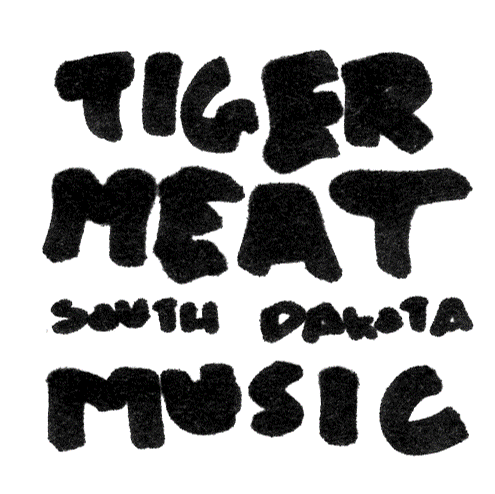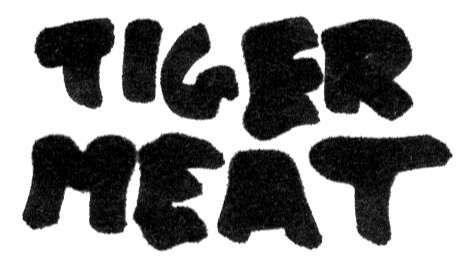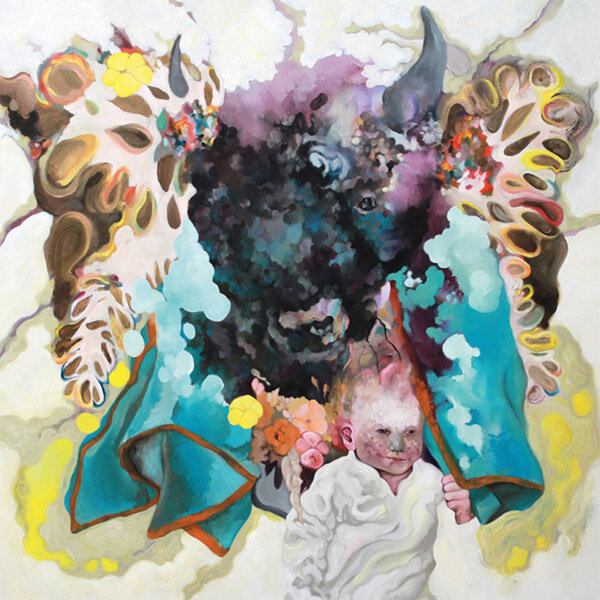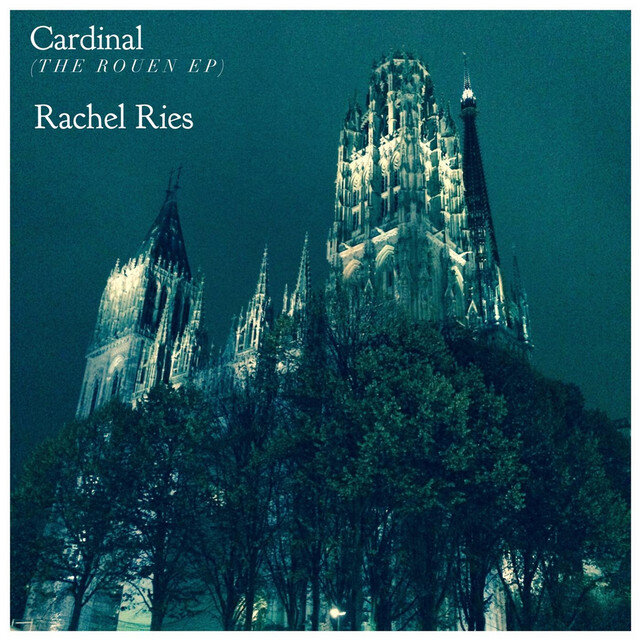Eric Holm
Eric Holm
2019 | Country
— track 5: "Queer Kids in Red States”
Eric Holm: So there’s six of us. My little sister and my mom are musical, but not, like, look-at-me musical. Whereas the four boys, you know, my dad and my two brothers — I’m the oldest — so the four of us would do The Holm Family Singers, or we would call it the Holm Boys. We have this kind of funny thing where it’s like, do you know the term “blood harmony”? Where it’s like we’ve been singing together so much and so foundationally that we improvise the same harmonies. But we will sometimes improvise the same harmonies at the same time, so then nobody is left on the melody, you know that game. So when we’re about to sing in church, or whatever, it’s definitely like, “Okay, and on this part, who’s going down? Who’s going up?” My little brother Carter who is the middle brother is always like, “I’ll do the melody, okay…” He’s got a wonderful voice, he sounds great on the melody, but everybody is always like, “Oh! Oo! I’ve got an idea!” And it’s the same, we’ve all stolen each other’s ideas.
[In 2019] the Holm Family tour started in Brookings, and about half the songs were these more political songs: We did “Dolly & Jesus,” we did “Queer Kids in Red States,” we did “Grampa Would Have Been So Mad,” but more of them were a kind of — we did “Hard Times Come Again No More,” we did a song that I wrote called “Mama Goddess” which envisions God as a femme creature, or as she/her pronouns for that higher power but otherwise it’s a prayer song, it’s a hymn. So when we did those concerts it was really interesting because we did Brookings, Minneapolis, Chicago, New York, and Maine, and, you know, I think different songs hit differently in different places. So when we started out at Lake Poinsett, and it was all these older folks, you know, patients of my dad, and members of his choir, and as South Dakotans I think it was an all white crowd, and we had served them ice cream, and it was very homey and very friendly, and I was like, “Oh welcome! Okay! We’re going to get ready to begin!” and then it was like, “Muslims and trans people deserve to sit with us at the Jesus table,” there was an interesting quality of everyone, like, listening but also, like, “What did we get ourselves into?” Like, “I thought that Dr. Holm was just going to give us a nice treat!” And then by the end it is, but they had to drink their medicine a little bit. But then in other places I think those earlier parts of the set — we always did it in the same order — I think in those earlier parts of the set they were more like, “Hell yeah! Alright!” I said something like, “He would be so pissed. Christ would be so angry at us he would flip tables,” and somebody went “Woo!” in Brooklyn, you know, they were really into it, but then when it got to the more, kind of, hymn songs and little bit more earnest, I felt that the Brooklyn crowd was a little bit, I think, pleasantly challenged by earnestness. It was just like, “We are a family! We love each other! Dad’s dying! Let’s sing about cancer!” [laughs] We sang a song called “Sickness and Health” which is not on the record, but it’s about my family’s cancer fight, and Dad sang the last verse, and it was just deeply sincere. And that is a little bit shocking in the non-country music world. The thing that country music demands of us, that we just openly let ourselves sing about heartbreak, and sadness, and alcoholism, that’s not really hip in certain circles.
//\\//\\//
My dad played the Takamine 12-string, so I didn’t know that guitars don’t normally sound so big and jangly, you know? And I still sort of associate acoustic 12-string with my dad. And he recently died. He died about a year ago. But he was a doctor [Dr. Rick Holm was also the “Prairie Doc” on SDPB], and he always thought, “Oh, in some alternate life if I hadn’t gone into medicine, I would maybe be a choir teacher or something.” He got his fraternity in college to compete in choir competitions, and he would win. He would kind of recruit them, and then he would be super energetic, and, you know, music was always a big part of his life. And even in the last, I don’t know, ten years before he died, he was running a Brookings-based hospice volunteer choir, called the Hopeful Spirit Chorale, which is still existing, although his death also coincided with the pandemic, so.
[My dad] taught me guitar a little bit, although he was more just a believer in education, and I had piano lessons all growing up, and then eventually I started working with the great Gary Snow. I don’t know if you know Gary Snow, but he’s just, you know, I think one of the great guitar players in South Dakota history, probably. He’s just the sweetest guy. When Dad was really sick he came and spent hours with us just plucking, picking tunes. A fine singer, but just a great guitar player and a really good teacher. So that was really my guitar world. Although, for better or for worse, I’ve always been an artist, and I’ve always been pleasantly torn between different passions and different media. [At Brookings High School] I did a lot of theater and choir, and that sort of thing, but also I did an independent “let’s do a play.” We did short, ten-minute plays, and in that same era I made a ten song record with Gary Snow. With his, you know, late-90s recording equipment. Yeah, so I have some baby albums before I — I recently released what I think of as my debut album, because I’m trying to get everyone to hear it, but I do have some self-recorded, or you know, some recording projects from high school and college.
Brookings was a really supportive place for a young artist. I think it’s hard to explain to artists from elsewhere that that’s the case, and I think I was in denial of it at the time, you know, by the time I was a senior in high school I was, like, so hungry for the Twin Cities, you know, and that’s where I spent ten years before moving to New York. Even within a culture that might be oversimplified as like a “red state culture” there’s lots of just natural human diversity within that. Artists can come from anywhere, and theater departments can be in the smallest towns. The band room can be a safe-haven in the most violent communities.
I think that with my family being in this kind of upper-middle-class world of doctors, and business people, and family friends were — My first real art mentor was the head of the art department at South Dakota State, Dr. Norman Gambill, who was a great hero of local artists in Brookings, and, um, he didn’t come out as a gay person until he retired at 70. So there was this kind of interesting world of, like, “Oh yeah my family talks to the Orson Welles expert,” and, “My family is interested in art and music,” and we always had a season pass to the Prairie Repertory Theatre, and South Dakota State theater, and I saw Chorus Line at South Dakota State and there’s openly queer characters in that play. And I was in the theater department and I was surrounded by very creative people, really smart kids. So anyways, that’s all to say, I think my particular circumstance of Brookings, and of thinking of Brookings as, “Well, we’re actually a pretty liberal spot in South Dakota,” is a kind of self-deception. “The University is there, so actually we are more progressive,” when of course — My political awakening has been going on for some time, but one of the things that I was in denial about, the fact that [Trump] got I think 70% of the vote in Brookings County, I was like, “what?” And this exceptionalism around, like, “Oh East River is better than West River, or South Dakota is better than North Dakota, or Brookings is better than Sioux Falls,” it’s all this running away of the white responsibility, you know? This land was for tribal hunting, and it is now all privately-owned, corn and soybeans. Agribusiness. And we’re just not meant to talk about that. We’re meant to think about the ways in which we have it pretty good. My relationship with South Dakota is complicated, and I have lots of complicated, and loving, and fraught feelings around: that land is stolen, and that’s my home. And I grew up in this incredibly flat, and stunning, austere prairie that ought not belong to anyone. I have a song called “Corn and Beans” that’s not on my album that is, you know, kind of trying to confront, like, yeah I feel — especially when I’m away — I feel really nostalgic for the corn finally getting its yellow tassels in the late summer. That’s a stunning moment in the late summer, and I have this very personal relationship with prairie sunrise that I feel like is mine, and um, and then the more I think about it, the more I think, “Well, we’ve inherited a lot of violence.” I’ve inherited a lot. A lot of good and a lot of bad. My relationship with Brookings makes me think about that. Why couldn’t Norman — Why couldn’t I have had a queer role model my whole life? Instead of just discovering that I had a queer role model my whole life and he couldn’t talk about it.
//\\//\\//
I was in Brooklyn and I was a regular at a Brooklyn-version of a honkytonk. It was like Brooklyn impersonating Austin, so, very hip. It was all, peanut shells on the floor and Lone Star Beer. There was lots of, kind of, folk art on the wall, like, instead of a velvet Elvis there was a velvet Willie Nelson. It’s called Skinny Dennis. Skinny Dennis is the name of the bar, and it’s one of the great bars in New York City. And that’s where I really fell in love with country music, unironically. You know, I would listen to country music in the car as a kind of, like, “Ah, I’m spying on the right wing.” Like, guilty pleasure of, like, “Well, this is beautifully well-crafted propaganda.” Like, one song that I fell in love with was “Beer on the Table.” Do you know that song? It goes, “Cuz I got gas in my truck and butter on my biscuit. I’ve always got the money for my scratch off ticket.” It’s about, like, I’ve got everything I need. “I still got running water and they ain’t turned out the lights.” And in a way there’s some part of me that’s like, “Yes! Why don’t we have more songs about ‘I’m poor but I’m happy,’ you know?” But then when you listen to the song again it’s about “I hate my job! But you gotta stick with jobs you hate!” You know? It’s like, “Capitalism is a bitch and I can’t get ahead! But at least I’ve got enough to survive, so we’ll call it good!” I wrote a kind of ironic — this was still, like, proto-songwriter, like, “Country music is funny! I want to fuck with it.” And so I wrote a hipster version of it that was like, “I make enough money that I can afford weed,” that was kind of the joke. But that kind of got me thinking about, like — what I used to think, just listening to the radio, is that this entire genre of music after 9/11 had kind of given itself over to the right wing to make pro-capitalist, anti-tax, white-supremacist arguments, right? And then at Skinny Dennis, I would listen to Emmylou Harris and Dolly Parton, I mean they were very fancy honky-tonk cover bands, but I was listening to Rodney Crowell songs and Gram Parson songs and Merle Haggard, and, like, the stew is a lot thicker than I knew.
Right before Trump was elected, that fall I was working on a piece of theater which was very good, but it was very — it was not for everyone. It was not meant to be accessible. It was a work of avant-garde, sometimes abstracted, and you’re not meant to always follow it. And I had been working in the kind of world of downtown performance art and I was seeing a lot of incredible stuff, but the baseline of expectation for every work of art was that the audience would be, uh, like me. Probably an MFA, and certainly interested in the artist, and perhaps I know them because we’re all rubbing shoulders with each other. And that happened to be the same fall that my dad was diagnosed. So I came home for Christmas for a longer Christmas than normal, and I just felt the, um, you know, the election had not only not gone our way, but I didn’t know a single person — not a single person — that voted for Trump or that thought that there was a chance in hell, right? The reality of, “Oh, our informational bubbles are siloed-off from each other,” became super clear when I was home and many people were kind of celebratory like, “Fuck the democrats.” I was at the bars with my brother and it was just a dark feeling, you know, it was like, “Cancer is coming and so is fascism.” And “Dolly & Jesus” was kind of a concept that I had been poking at or fucking around with in my head, and I just felt, when I got back from Christmas break, when I was back in Brooklyn in January, I felt the kind of rumblings of, like, “I can’t make avant-garde performance art for left-wing, anarchist, Brooklynites. I can’t do it anymore. I have to change my audience.” I’ve been playing with this idea of, “We move to the city to find our collaborators, and to find our influences, but sometimes we have to leave the city to find our audience.”
And so it was only after, you know, like, “Oh this bar [Skinny Dennis] is nearby. Oh it always has live music. Oh they’ve always got, like, pretty awesome country music.” And then, there’s this Asian, long-haired, bespectacled, pedal steel player and he’s just fucking killing it every time. Every time I’m in there, this looks-like-a-surfer — now I learned later that he splits his time in Hawaii and he is a surfer, but yeah, Jonny Lam. I think he was the first Chinese-American to play at the Country Music Hall of Fame. He’s just one of the best pedal steel players in the game, and he just, you know, he doesn’t “look like a country music player,” because the field has been so segregated. So he’s kind of the fanciest player [on the album]. The guitar player Andrew Lynch is a dear, dear friend of mine, so I paid him less [laughs]. I met the producer at Skinny Dennis, John Epperly, and he’s a real mainstay of that scene, that kind of edge of, “Is it rock or is it country?” Well it’s both. He’s just a sweet and wonderful guy who really knows the music. So he helped me recruit Jonny Lam and he helped me recruit Max [Newland] and Justin [Greville] who played bass and drums. I brought in the singers, Elizabeth May and Nicole Ketchledge-Ortiz who is my cousin. So there’s a little bit of that blood harmony with my cousin, we harmonize a lot together. A lot of theater people. The singers are theater people, Andrew Lynch is a musical theater composer, so in a way it’s a kind of this mashing up of inviting theater people into the country music world. I just want those stories to be clear. Sometimes people don’t think through the dramaturgy of your songwriting.
“Grampa Would Have Been So Mad” was the second song that I wrote in that batch, and it was just like, “Okay, I want it to be clear, I want it to be funny, I want it to be understandable, and I want it to be for everyone. So how can that be for everyone?” I think there’s something about American music, what Gram Parsons calls Cosmic American Music, that if you kind of let it all in, let it all into the soup, then there’s no reason that anyone can say, “Oh, that’s not for me.” So this idea of, like, the pedal steel will tell a certain group that they’re invited, but the lyrics will tell a different group that they’re invited, you know? Just super inspired by Willie Nelson and this idea of, like, “Wait, is this for hippies or hillbillies?” Yes! Yes, it’s for hippies and hillbillies! And I’m not from the South, I’m from the Midwest, I’m from South Dakota, so it’s a little bit more like: Moderates, and liberals, and progressives, and leftists, and radical anarchists, and atheists, and Christians, um, I don’t think that the fascists are going to be into it, and that’s okay, they’re not really invited. But if you’re maybe uncertain about whatever, you’ve been fed some bullshit, you’ve been fed some propaganda in Brookings about, “Well, Black Lives Matter is actually interested in violence.” It’s like, “Well, no. You’re wrong. And you can listen to the songs. You’re invited.” Whereas they weren’t invited to see the abstract performance art, you know?
For better or for worse, I just sort of focused on the studio. I was kind of in the process of getting ready to leave New York, in my heart. It was a year later that I moved to New Orleans. It was mostly, “I gotta get this studio album done and then figure out how to tour.” At the time, I wasn’t trying to form a band, although now I am hungry for a band. How does that — there’s a Lucinda Williams lyric, “I just want a good bed and a rock and roll band.” Something like that. I had big dreams for a tour last summer, that had to just wait. But yeah I’m hoping to do a big national tour this summer, and I think different regions will have different bands. If I, kind of, take all my theater friends and all my ambitions, I think I can stitch together a DIY backyard tour, like we did with the family band. I’ve got a bunch of new songs, and I’m planning on more recording. I also sing to babies, have I told you about that? I kind of love the idea that as I tour the country, I’m hoping to also book the Teacher Eric shows. So it’s sort of this idea of, like, “Mild-mannered, queer Mister Rogers by day. Radical queer country music at night.”
//\\//\\//
Gram [Parsons] died young, and if he had stuck around and maybe set down the bottle, who knows what kind of music he would have made? I’m a good ten years older than he was when he died, and I think about how I was partially radicalized when I landed in New York in 2011 and it was the Occupy Wall Street protests. I was there. I occupied, like, three times. My first time I went was, “They are going to clear us out of this park unless enough people showed up,” and we got up at 5:00 and showed up at 6:00 and we stopped them. So I was a little bit a part of that as I was studying art-making, theater-making. And, you know, on the one hand, combining different kinds of American music and saying, “this is all equally important and equally valid,” in a way that is inherently political. I think that Gram’s ideas, and with Willie too, of like, “No one is excluded. No one is lesser. No music is lesser,” that’s inherently political, but in this age where they are literally lighting these pitchforks, lighting the tiki torches, we can’t afford to be — especially white people — we can’t afford to be “kind of” political, “glancingly” political, “semi” political, we have to be loudly fighting for life. For life and for acceptance. We have to be fighting for human rights over the rights of capital, the rights of these corporations who claim to be humans. We know that that’s not true. Humans die at the age of 80, you know? So this is all to say that I knew that my country music had to be explicitly political, and in that way I also knew — I guess I also knew that I wanted to use a comforting voice. I wanted to use beauty. So if I can give you something that’s sort of undeniably pretty — it’s tricky, right, because I want everyone to feel invited, but that doesn’t mean you won’t be challenged. I think that it can be a challenging record to certain folks. The first song is about a loving relationship that is with a married person, and it’s totally consensual, and the husband is involved. And then this idea of, I don’t drink anymore but I smoke cannabis. Well this is verboten in several different ways, in recovery circles and also in a kind of straight society. Not all of my songs do that, but this debut album, I wanted it to be, again if you get that pedal steel in there and the high harmonies, it can be a gift to the ears even if it’s a punch in the gut. That’s sort of the strategy. And then also for those of us who don’t feel invited into country music because there’s no songs about polyamorous people, and there’s no songs about queer people, and there’s no songs about radical leftists trying to fight fascism, you know, because those of us on the left don’t feel included, it’s like, “I don’t want to hear your beautiful high harmonies and your pedal steel guitars if you’re going to kill my people.” In Brooklyn I had a trans roommate, and I was listening to the Trio album, you know, Emmylou, Linda Ronstadt, and Dolly. It’s a total classic. It’s a fucking gift to the world, right? It’s just so pretty. And my friend came and they said, “Those people want to kill me. Why are you listening to their music?” And I wanted to be like, “Dolly doesn’t want to kill you,” but I knew what they were saying. So [this album] is an antidote to that. For some people it’ll be challenging, but for other people it’ll be welcoming. “Oh, there’s a polyqueer leftist who is doing pedal steel, and high harmonies, and three-chord truth-teller story songs?” So, um, that’s me. We’re out there. It exists.
ERIC HOLM'S ESSENTIAL SOUTH DAKOTA ALBUMS
Camp Dark — Nightmare in a Day (2015)
Adam Svec — Sun Because (2018)
Proofreader. — Zero Squared (2013)
Buffalo Moon — Selva Surreal (2011)
Mike Lee — Pick Me Up Café (2020)
Rachel Ries — Cardinal (The Rouen EP) (2016)
Nightshades — 9 Roses (2021)
SOURCES
Holm, Eric. Interview. By Jon Bakken. 22 Apr. 2021.












